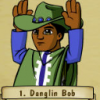Warning: incoming game incoming wall of text
Extra Credits is okay but their content is nothing new,
"MIT is a decent university, but their physics classes are nothing new. They just regurgitate the same stuff other schools teach." 
Why should Extra Credits need something "new"? If someone is looking for pre-canned gimmick mechanics, someplace like Three Hundred Mechanics may interest them more.
And if we are looking for cutting edge theories and groundbreaking research, we can read the research articles directly (which comes from hundreds of disparate individuals, with various skill or lack of skill in communication). In that case, Gamasutra and GDC Vault probably are closer to what one would want, though both have alot of unrelated content as well, so you'll have to wade through it to find what interests you. (Gamasutra also has many non-professional opinion blog posts, which are much more hit and miss than actual expert opinions and articles)
But if you are looking for a more general and well-rounded foundation of the basics of design, i.e. what a teacher might teach, Extra Credits does a fantastic job.
you can find articles and other designers talking about the stuff he talks about way before he does it.
Absolutely. You can find the exact same stuff taught in MIT Physics courses all over the place also. What does it matter?
"We already have five people teaching subject X. We don't need a sixth one!"
If you want to hunt down hundreds of articles of varying degree of quality, fantastic! You know what that's called? Genuine research. You'd be researching. That's also very important! Nobody is saying watch Extra Credits instead of doing research.
Extra Credits is presenting condensed, dressed up, entertaining, but ultimately educational material to people wanting to be taught. Being taught and doing research are different things. Both have a place in education. Often, being taught is someone's onramp to later doing their own research of other people's articles, which can later be an onramp into them running their own experiments and presenting their results for others to read.
He's not researching, he's teaching. Sharing his opinions and experiences, not spouting edicts, not having discussions, but sharing his views.
Gah! Now you tricked me into saying "he" like it's one person.  There's three people who work on each video (excluding the artist(s)).
There's three people who work on each video (excluding the artist(s)).
And yes, when sharing views, people often accidentally speak as if they are facts. That's a common way of talking about something you are passionate about; I perfectly understand that their views are their views - they don't need to put a verbal asterisk on every sentence. Further, I'd bet if you ask them, they'd openly admit their views are up for debate, and openly encourage you to debate them and don't take their opinions for granted.
They might not be the best teachers, or the most learned, or the most experienced. I don't mind. It's still valuable to me.
Can old Mrs. Tiggy-Winkle not teach 4th grade class, because she's not a PHD? 
The content they put out is consistently valuable and educational and entertaining. Half a million people subscribe, a quarter of a million watch their videos on a semi-regular basis. Some may "just" be game players casually curious about game design (in the same way I'm a fan of history, despite not wanting to be a historian by profession). Some may want to become game designers, and are learning the basics. Some may already know the basics, but are interested in other viewpoints, and some may want to be reminded to apply the concepts they've already learned.
If there's one complaint I'd hold against them is that the videos might be too entertaining, and might lean too much in the entertainment direction than the educational direction. But they are still very educational, and many teachers struggle to present educational material in an entertaining way. If I can relax from programming and still learning valuable skills while relaxing, that's fantastic. The only problem is that I still need to be able to learn the material by remembering the information, and think things through, and then remember to apply it. If the videos are too entertaining, I'm not always in "learn mode", and sometimes I'm just in "mindless entertainment mode" where I forget about it a few minutes later. 
It's still valuable knowledge to me, because they sometimes talk about ideas I haven't thought of, and give different views to the ideas I have thought of. And I think about game design alot (just as I think of programming and game content ideas (e.g. worlds, lore, stories, characters, enemies, areas/levels/dungeons, etc...). And I have regular discussions with others about game design - No, I don't mean just "here's an idea I had!" content ideas, I mean debates about game mechanics in the theoretical and abstract, as well as discussions about more concrete implementations. I discuss game mechanic design, character design, writing, and world design with an artist friend, and often we get into some pretty heated debates. I also, as an amateur, discuss game design on this forum with others.
Yes, I also read plenty of other sources of articles and books and videos from other people as well - industry recognized "experts" and also amateurs. I take in all I can get, and think it through and filter it, saving what I think may be useful. I disagree with some pieces, I agree with other pieces. I try not to dismiss an entire author's work because I disagree with one or two things he said - that's not the road to knowledge. If we truly want to value knowledge and truth, we need to accept valid knowledge even from sources we don't like. 
In addition to opinions I hadn't thought of, and views that differ than my own (both of which are incredibly valuable in themselves), even when they are discussing things I already agree with and already thought of, it's still valuable because they act as reminders to actually apply those ideas and rethink them, in the same way when learning math you have to repeatedly rethink how some part of math works to learn it properly.
Again, if you think the videos aren't providing enough value for you, that's perfectly understandable! If you find better more valuable sources of content-dense educational material, please please please share them with us, so we can add them to our collection of existing resources. "Without counsel, plans go awry, But in the multitude of advisors they are established.". It's important to absorb alot of data from a lot of different sources, and of many different viewpoints, and think them through yourself.
He also pushes a very narrow view of design and while that view is the generally accepted view...
You mean like teachers do?  How dare physics teachers only teach the generally accepted view(s)! They should be teaching every fringe theory that pops up and fades out after a few weeks.
How dare physics teachers only teach the generally accepted view(s)! They should be teaching every fringe theory that pops up and fades out after a few weeks.
(Teach the player before any large penalty for failing) there are games that are successful that don't have this and while their design is technically bad it works for them.
Game X can do 99 things right, and be a fantastic game. If they do 1 thing wrong, that doesn't mean it automatically ruins the game.
Saying that Game X implemented mechanic Y wrong, doesn't mean Game X is a bad game.
Saying "it works for them", may mean either that the game benefits from it, or that the game is good in spite of the flaws in the game. If a game is good in spite of the flaws, that doesn't mean the flaws themselves are (by default) good.
And yes, game design "rules" are guidelines, not laws, so a game can intelligently do what might normally be considered a bad idea, and it might benefit the game.
I don't think Extra Credits needs to thoroughly and comprehensively go into every exception to every game design video they do. By default, we can already assume that game design "rules" are guidelines.
Is your complaint that they should mention this more often? Yea, that's a reasonable suggestion. Maybe they should put a default reminder at the end of every video. I don't think the absence of the reminder is something I can honestly hold against them.
Or are you saying you'd like some videos to go in-depth for 20-30 minutes on one specific area of game design, to more comprehensively and deeply cover a specific topic? Yeah, that'd be awesome too. I'd enjoy that, though I wouldn't always have time to go through them, and I don't think that should replace their existing format. Often times the 5-minute overview is enough for my mind to automatically fill in the exceptions and variations and counter-points, and I'd hate to have to go through 30 minutes just to dig out the overview if my mind can fill in the rest of the major details in 60 seconds, and lazy evaluate the rest on-demand. Lazy evaluation happens alot in my brain, and sometimes it's alot more beneficial to just get and remember the bullet points and lazy-evaluate the rest when needed (often times nigh-instantaneously). I imagine other people's brains work similar?
That is what really matters in design. The Golden Rule: There is no golden rule.
To be able to intelligently break the rules, first you must knowledgeably know them. Otherwise, your design successes are accidental. They may still be successes, but you might not understand why they work in one situation but not another, preventing you from skillfully applying or ignoring the rules in the appropriate circumstances.
![]()

















